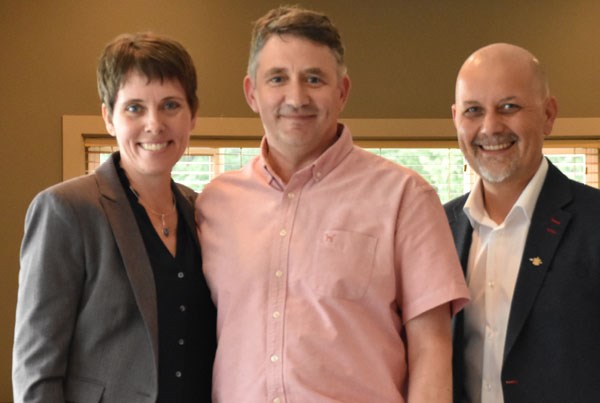BC Green leader Andrew Weaver, and MLAs Sonia Furstenau of Cowichan Valley and Adam Olsen of Saanich North and the Islands, have been touring the province, holding community forums to, as the party puts it, “discuss the first year of the BC Green caucus working collaboratively with the BC NDP minority government.”
Furstenau and Olsen joined Powell River Sunshine Coast MLA Nicholas Simons at a Sechelt Chamber of Commerce lunch ahead of the Aug. 23 forum in Gibsons, although they were a little late because of flight delays caused by smoky skies in the region.
Simons opened the talk on his own, touching on some local issues including efforts to get improvements to Highway 101 and BC Ferries, and extolling the virtues of the working relationship between the NDP and Greens at the legislature.
“What I noticed since the election of the last parliament, which included three members of the Green Party, is that we actually, together, with different perspectives can come to agreement on a number of issues,” he said. “It’s refreshing to me to have my thoughts about that confirmed... When you have two parties that are agreeing on a number of policies together, you can see that there is room for discussion, there’s room for negotiation and there’s room for coming to agreement.”
Olsen and Furstenau arrived just as Simons was tackling a question about proportional representation (PR) – the subject of a mail-in referendum being held between Oct. 22 and Nov. 2 – and saying he feels it could lead to legislatures that operate along similar lines as the cooperation between the Greens and NDP to support the NDP minority through a confidence and supply agreement.
Furstenau and Olsen picked up the theme.
Furstenau called the Green-NDP agreement a “great experiment” that’s yielding positive results. “Cast your mind back to a year ago, and all the pundits [saying] it won’t last, it can’t be done, it’s not possible, there can’t be cooperation across party lines, it’s unstable. You’ll notice that most of that narrative has fallen away,” she said.
“When we get polarized in first-past-the-post adversarial politics, it pushes the parties out to those edges and they end up operating in the way that represents less of the majority of the people.”
Olsen added that the current system is set up to be confrontational and pit “our perfect values against their crazy, dastardly values. They’re good, we’re evil. They’re black, we’re white. This is our political system as it exists right now, and I can tell you there’s only one institution in this province that benefits, and that’s the party institution.”
Furstenau said the Greens originally wanted a single question referendum, but now that she’s seen the ballot, which will also ask PR supporters to rank three possible systems – dual member proportional, mixed-member proportional, and rural-urban proportional – in order of preference, she likes the approach.
“If you don’t want to get into all of that, you can only answer the first question… You can choose first-past-the-post or proportional representation and you can stop right there.”
She also said the Greens are not advocating for one system over the others, because all three would have similar outcomes. They would all ensure a locally accountable MLA, she said, and “there’s a first-past-the-post element to all of them.”
The comments from the trio of MLAs were in direct contrast to claims about proportional representation made by the No Proportional Representation Society of BC, a group getting $500,000 in funding to advocate for the no side in the referendum.
The “Case against Proportional Representation” posted on the group’s website claims PR leads to more coalition governments, which it claims are more likely to lead to legislative gridlock, and that it could give small parties “enormous sway over the survival of a government coalition.”
No PR BC also claims proportional representation could create a system where voters have no “constituent-elected representative ... [which] would be particularly harmful to less populated regions.”
Olsen and Furstenau drew more than 100 people to the public event in Gibsons that evening, where the majority of the discussion was also around the working relationship between the Greens and NDP and the upcoming PR referendum.



